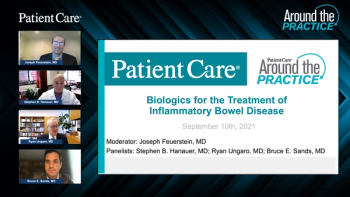
Risk factors and characteristics that distinguish ulcerative colitis from Crohn’s disease.

Risk factors and characteristics that distinguish ulcerative colitis from Crohn’s disease.

Red flag symptoms that should prompt a primary care physician to refer a patient to a gastroenterologist for proper assessment for a potential inflammatory bowel disease.

Criteria used by gastroenterologists to evaluate patients with an inflammatory bowel disease for relapses or disease progression.

GI specialists review the case of a 24-year-old woman who presents with symptoms that suggest inflammatory bowel disease and suggest how they would appropriately test and diagnose the patient before initiating therapy.

A review of various classes of biologic therapies available to treat patients with ulcerative colitis or Crohn's disease.

What to know in terms of integrating new oral, small molecule targeted drugs into treatment plans for patients with ulcerative colitis.

Recommendations when assessing response to biologic therapies used to treat ulcerative colitis and Crohn disease.

Factors that impact which biologic therapy a gastrointestinal specialist may initiate for a patient with inflammatory bowel disease, especially during the COVID-19 pandemic.

Recommendations for monitoring a 24-year-old woman treated with biologic therapy to manage inflammatory bowel disease to evaluate treatment efficacy.

How to best treat a patient with inflammatory bowel disease who demonstrates no disease response to initial biologic treatment, as well as insight surrounding the treatment of patients who develop perianal disease.

A glance at therapeutic strategies being investigated to improve the treatment and outcomes of patients with ulcerative colitis and Crohn disease.